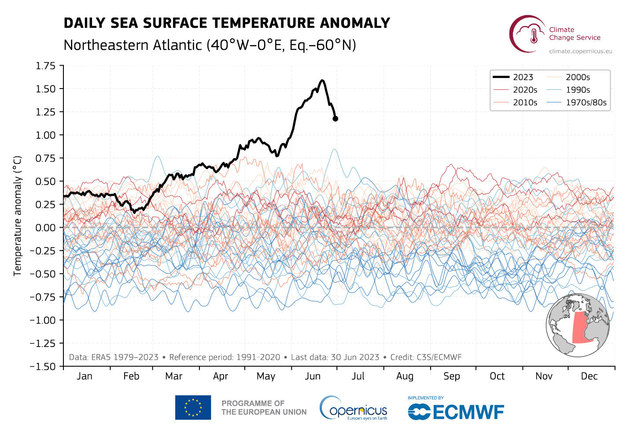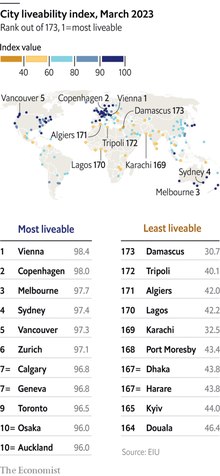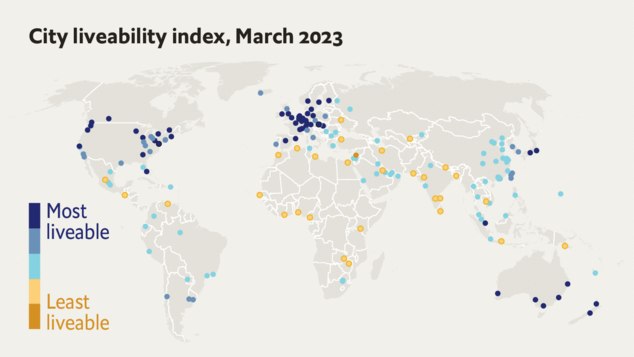Comments
-
Ukraine Crisis, right.
By the way, if mercenaries (not a national army) attack Poland in some way, can NATO then identify a nation to hold accountable? I guess so.
Wagner Attack On Poland Will Be Treated As Russian Attack On NATO: US Ambassador To UN
— Parth Satam · The EurAsian Times · Aug 1, 2023
Well, if they were deployed from Belarus (who hasn't exactly kept their presence/status a secret)...
Apart from spying and destabilization and such efforts, it seems unlikely that Belarus (or Russia) would attack Poland. -
Ukraine CrisisI suppose that's one way to snag up cannon fodder:
Russia is forcing Ukrainians from occupied Crimea and Donbas to fight in its invasion of Ukraine
— Halya Coynash · Human Rights in Ukraine · Mar 7, 2022
Russia turns to Donbas conscripts to fill front lines
— Polina Ivanova · Financial Times · Jun 11, 2022
Russia Pressing Men In Occupied Areas Of Ukraine Into Fight Against Ukrainian Forces
— RFE/RL · Sep 26, 2022
Russia "officially" annexes Donbas on Sep 30, 2022
— Wikipedia
Russia engaged in extensive effort to force Ukrainians in Russian-occupied territories to accept Russian citizenship, report says
— Jennifer Hansler · CNN · Aug 2, 2023
Furthermore, unfortunate people are trapped between Russian and Ukrainian law:
Russia forced them to fight. Ukraine tried them for treason
— Kateryna Farbar · openDemocracy · Nov 16, 2022
I'm guessing (conjecture on my part) that Ukraine / Ukrainian law is more amenable to un-trap those people. Ukraine also has an interest in acceptance into organizations that would look favorable on such amendments. Maybe the resident legal experts know something? -
Ukraine CrisisPoland busts another Russian spy network, this time around unveiling plans to attack Ukraine-bound trains. Lukashenko + Putin "mention" that Wagner would like to hit Poland (on more than one occasion). Wagner mercs train close to Polish border; Poland + Baltics nervous. Poland enacts controversial law to deal with Russian influence. Belarusian choppers enter Poland airspace. Russia posts about Poland taking over Western Ukraine. EU ready to close Belarus borders.
There's more to the story of course, yet seems to follow an old playbook.
Nyberg writes up some political history:
Russia, Ukraine, and Poland: The End of a Tragic Triangle
— René Nyberg · Carnegie · Jul 28, 2023
(... also check the crɘeǝpy TASS post above)
Bit of a contrast in terms of Russia here:
Niger coup (reports from Jul 31, 2023): CNN, Forbes (Russian flags)
Georgian protests (reports from Aug 1, 2023): BBC, Business Insider (simmering Kremlin-hate)
Maybe they should get together? :D
Anyway, while going over all this...stuff, I sure hope Putin hasn't had more warring in mind all along.
Hard at work to "recruit" here:
Russia Takes Its Ukraine Information War Into Video Games
— Steven Lee Myers, Steven Lee Myers · The New York Times · Jul 30, 2023
Minecraft and Roblox are being used to spread Russian propaganda to kids
— Michael Beckwith · Metro News · Jul 31, 2023
Russian anti-Ukrainian propaganda had made its way into ‘Minecraft’
— news.com.au · Aug 2, 2023 · 2m:24s
I predict it'll work, though to a limited extent. -
Climate change denialDubbed "the North Atlantic sea surface temperature anomaly":
High sea surface temperature in North Atlantic
— Arctic News · Apr 22, 2023

Rising temperatures threaten to trigger massive loss of sea ice (and loss of albedo) and eruptions of methane from the seafloor of the Arctic Ocean. Over the next few years, feedbacks threaten to start kicking in with increased ferocity and important tipping points threaten to get crossed, such as the latent heat tipping point and the seafloor methane tipping point.
Record-breaking North Atlantic Ocean temperatures contribute to extreme marine heatwaves
— Copernicus · Jul 6, 2023

While the causes of the anomalous warmth across the northeastern Atlantic are still a matter of research, there are already several contributing factors to take into consideration. These include atmospheric circulation, air pollution and climate change trends. -
Buy, Borrow, DieHmm... As an aside, I've come across a few that have mentioned they "game the system" for own gain (including on the forum), though on a much smaller scale (I assume). They good, those others bad...?
(my emphasis)
None of those are things we can do. That's the point. they're all things government can do.
Things we can do; — Isaac
4. vote differently (known as democracy :wink:)
But some folks work hard to vilify and stigmatize the word "socialism" and anything they can associate with that. One place to start, to put up a fight? :fire: (This wouldn't amount to vilifying and stigmatizing the word "capitalism" and anything that might be associated with that.) -
Ukraine CrisisA resident of the Sumy region kept a T-80 trophy tank of the occupiers in his yard for more than a year :shrug:
The Prosecutor's Office transferred the tank to the needs of the Armed Forces. — Bratchuk Sergey · Jul 30, 2023
Probably need a driver's license for those things. :D
"According to Russia's Duma Defense Committee ..."
Vladimir Putin Putting Together Network of Private Armies All Over Russia
— Veuer via Dailymotion · Jul 31, 2023 · 1m:12s
... Hmm.
The recent bombings on the Russian side of the border, including Moscow, seem unlikely to have much direct impact on the war. Though, after a year of bombing destruction killing throughout the Ukrainian side ("Sitting ducks with some repellent"), maybe it shouldn't come as a surprise. They're not using gear supplied directly by NATO members, and are reportedly working with Rheinmetall, Baykar, and others to set up production in Ukraine. Ukraine → Moscow is a fair distance (say, ≈ 850 km). Were the drones launched closer by? What were they (e.g. "homemade", snagged Iranian drones, something else)?
Elon Musk refused Ukraine's request for Starlink that would help it attack Russian ships with exploding sea drones, report says
— Sinéad Baker · Business Insider · Jul 31, 2023 -
Ukraine CrisisClimate is less interesting because experts don't really disagree. — Isaac
Depends on what part. What, if anything, can/should be done is less clear. -
Ukraine CrisisThe ongoing grain thing ...
Russia has not offered UN World Food Programme free grain
— Michelle Nichols, Doina Chiacu, Leslie Adler · Reuters · Jul 28, 2023
Russian missile attacks leave few options for Ukrainian farmers looking to export grain
— Hanna Arhirova, Volodymyr Yurchuk, Courtney Bonnell · AP · Jul 30, 2023
(FYI, Agroprosperis' homepage is in Ukrainian; there's a bit of information on wikipedia and elsewhere)
As if on cue, the Kremlin unveiled naval expansion St Petersburg.
Regress. :/ The Kremlin is increasingly hard to excuse here.
Donbas and Crimea — IsaacCrimea — IsaacCrimea — Isaac
We have lots more to go by (Putin's Russia itself, Chechnya, Georgia, trajectories and moves, regress and improvement), but I guess this stuff has already come up a few times in the thread. The Ukrainians (and the UN) said "No". The Kremlin might well have worsened life for Russians (at large), except, perhaps, for the Putinistas.
Kim Jong Un delivers an ultimatum to South Korea (including via whatever representatives): we'll be taking over the Gyeonggi and Gangwon provinces and everything north thereof, as per the map you received. In case of any non-compliance, we start nuking. Non-negotiable.
(The exact areas somewhat arbitrarily chosen. Surely an example of insanity at the helm, however unrealistic the scenario may be. There are some 50 million people in South Korea, a fifth of them in Seoul.)
What to do?
1. Quick, pre-emptive strike.
2. Everyone on full readiness, anti-air systems, everything, pronto.
3. Broadcast surrender. Border guards (and others) stand down.
4. Don't do anything. Perhaps hope it's an organized hoax.
The military security situation in the area of the Korean peninsula, which has undergone a fundamental change due to the reckless military moves of the U.S. and its followers, more clearly indicates what mission the nuclear weapons of [North Korea] should carry out. I remind the U.S. military of the fact that the ever-increasing visibility of the deployment of the strategic nuclear submarine and other strategic assets may fall under the conditions of the use of nuclear weapons specified in the [North Korean] law on the nuclear force policy. — Kang Sun Nam (via The Hill · Jul 20, 2023)
I'll go with 2. Maybe I should have made it into a poll. Nah. -
Ukraine CrisisI'm wondering if there is a law against discussing/criticizing this:
Russian investigators call children as witnesses against their mother accused of discrediting army
— AP · Jul 29, 2023
For that matter, is there a law against discussing/criticizing those war censorship laws?
Presumably they can't be used to enforce themselves.
Can anyone semi-informed imagine who might replace Putin, and what policy changes would result? Or am I only dreaming? — unenlightened
There are a few marginally better/worse in terms of democracy and transparency. Someone like Yashin might well give democracy a chance. Putin has consolidated a number of power positions, making such moves challenging, though.
The Economist has a "City liveability index"; Kyiv dropped close to the bottom in Mar 2023:

There seems to be a recognizable geographical distribution:

I'm darkly fascinated by this new trend for absolute certainty in the mainstream opinion. Ukraine, Covid, ... both shared this odd feature that even though solidly qualified experts in the respective fields disagreed, the lay populace were utterly convinced that only one side were right and the other were little short of murderers. — Isaac
Have you tried climate? Abortion? ... ← Some here considered little short of potential genociders? :gasp:
(hm "absolute certainty", more rhetoramble?)
The Ukraine war isn't quite as amenable to scientific inquiry anyway. -
Ukraine CrisisAngry Russia refuses to speak at UN meeting on its attacks on Ukraine’s key port city of Odesa
— Edith M Lederer · AP · Jul 27, 2023
Speaking of angry: Jul 25, 2023.
Isolated Putin tries to shore up African support as Kremlin seethes over poor summit turnout
— Radina Gigova, Anna Chernova, Sophie Tanno, Nimi Princewill · CNN · Jul 27, 2023
Didn't go all that well the last time either: Jun 18, 2023.
Accumulating "alternate world" type stuff? (Jul 11, 2023, Jun 16, 2023, Mar 4, 2023)
Putin woos African leaders at a summit in Russia with promises of expanding trade and other ties
— Vladimir Isachenkov, Cara Anna · AP · Jul 28, 2023
Happy about free grain. Need more. -
Ukraine CrisisUmland opines
We’re going to need that Ukraine no-fly zone after all
— Andreas Umland · The Hill · Jul 27, 2023
mentioning
• food production + export
• nuclear facilities
• civilian infra, bombings of noncombatants
• reconstruction
while restricting no-flight to those that are unmanned (unauthorized).
Going half the way?
Some of this stuff has come up in the thread before. -
CoronavirusA thought experiment, if you will, turning the heat slightly up.
Suppose some mutations occur that are about as contagious/transmissible as the Omicron variant, about as dangerous as SARS-CoV-1 (the 2003 outbreak), where symptoms appear after 4-5 weeks, though some 25-50% turn out asymptomatic.
While this stuff remains unknown in the thought experiment, at first at least, what might we reasonably expect?
We have some data (including historical and also new) regarding propagation, medical establishments, medicine industries, general populace reactions, (emerging) policies, etc. These would be among the things where we could expect something.
I'm thinking the scenario is realistic enough, so, what might we expect, and how best to tackle such a situation (with partial/gradual knowledge along the way)? Say, what's a(n) (un)favored response/policy?
Personally, I wouldn't expect a tenth of the population wiped out, nor "1984". Tackling...not quite sure. (Looking to WHO guidelines is a starting point.)
EDITORIAL: Preparing for the next pandemic
— Toronto Sun · Jul 27, 2023
↑ has comments -
Ukraine CrisisFrom a Wagner commander, otherwise unverified (translation by google):
In total, 78,000 fighters of the PMC Wagner went to the Ukrainian mission. Of these, 49,000 were prisoners from the camps. At the time of the capture of Bakhmut (May 20), 22,000 soldiers were killed, 40,000 were wounded. — Unloading Wagner · Jul 19, 2023
NATO says it's boosting Black Sea surveillance, condemns Russian grain deal exit
— Andrew Gray, Ron Popeski, William Maclean · Reuters · Jul 26, 2023
Allies and Ukraine strongly condemned Russia's decision to withdraw from the Black Sea grain deal and its deliberate attempts to stop Ukraine's agricultural exports on which hundreds of millions of people worldwide depend. NATO and Allies are stepping up surveillance and reconnaissance in the Black Sea region, including with maritime patrol aircraft and drones. Allies noted that Russia's new warning area in the Black Sea, within Bulgaria's exclusive economic zone, has created new risks for miscalculation and escalation, as well as serious impediments to freedom of navigation.
Ukrainian port cities are "the latest casualities in this senseless, brutal war", ASG Khiari tells Security Council in briefing on Ukraine
— Mohamed Khaled Khiari · UN · Jul 26, 2023
UN official says latest Russian attacks on Ukraine ‘signal a calamitous turn’
— Tara Suter, AP · The Hill · Jul 26, 2023
These attacks targeting Ukraine’s grain export facilities, similarly to all attacks against civilians and civilian infrastructure, are unacceptable and must stop immediately. I must emphasize that attacks against civilians and civilian infrastructure may constitute a violation of international humanitarian law. We have now seen disturbing reports of further Russian strikes against port infrastructure, including grain storage facilities, in Reni and Izmail ports on the Danube River – a key route for shipment of Ukrainian grain, not far from Ukraine’s borders with Moldova and Romania. Deliberately targeting infrastructure that facilitates the export of food to the rest of the world could be life-threatening to millions of people who need access to affordable food. In the wake of Russia’s withdrawal from the Black Sea Initiative, these latest attacks signal a calamitous turn for Ukrainians and the world. — Mohamed Khaled Khiari (UN)
Maybe they are "insane".
, it's not just about "freedom to vote". (= rhetoramble (again)) -
God & Christianity Aren’t Special(I'll add some observations that are peripheral to the opening post, please let me know or remove if it veers too far off topic.)
A kind of mass hysteria:
Benny Hinn - Raw Anointing of the Spirit (1)
— Apr 8, 2010 · 10m:24s
Kenneth Hagin Explosion In The Holy Ghost
— Jun 20, 2023 · 1m
One Of The Most Powerful Move Of God In History - Rodney Howard-Browne & Németh Sándor
— Jul 19, 2023 · 5m:7s
By and large harmless, though I find employing that to indoctrinate children deplorable.
Another kind of mass hysteria (also some history):
Sweden Quran burning: Protesters storm embassy in Baghdad
— Alys Davies · BBC · Jun 29, 2023
Hundreds attempt to storm Baghdad’s Green Zone over Quran burning
— Al Jazeera · Jul 22, 2023
These provocations are insensitive, triggering the sensitive like so is unmannerly rude — and outlawing it has no place in civilized society. Say, if some society has a culture and tradition of biting satire, then it's not up to someone else to impede on that. Likewize for critique of religions.
'Not everything that is legal is ethical': Josep Borrell condemns Quran burning and religious hatred
— Jorge Liboreiro · Euronews · Jul 26, 2023
Hmm Stories that won't go away:
Burning of Qur’an in Stockholm funded by journalist with Kremlin ties
— Jennifer Rankin · The Guardian · Jan 27, 2023
BRIEF: dr·dk reports that a Quran burning inspired Russian intelligence to stage fake protests
— various · May 7, 2023
Sweden says it's target of Russia-backed disinformation over NATO, Koran burnings
— Simon Johnson, Johan Ahlander, William Maclean · Reuters · Jul 26, 2023
Secretly using the sensitive to trigger anger/violence? Nothing new I guess.
Religions have impacts on others and therefore warrant some attention. -
Ukraine CrisisHow to deal with an untrustworthy insane party that rules an armed country? Looks like it's not just Ukraine that has a problem here. Criminals and insane folks are sometimes restrained in some way. Really, what will they do next? Whatever comes to pass, I'm sure someone will be (are) taking notes.
So the US are sending 75 billion to Yemen too? Good news. — Isaac
No Sudan Somalia CAR Afghanistan ...? :/ -
Ukraine CrisisMore on the grain thing...
Analysis: Russia's Danube attacks tighten noose on Ukraine's grain sector
— Max Hunder, Jonathan Saul, Olena Harmash, Sybille de La Hamaide, Tom Balmforth, William Maclean · Reuters · Jul 25, 2023
Anger grows in Ukraine’s port city of Odesa after Russian bombardment hits beloved historic sites
— Hanna Arhirova, Lori Hinnant · AP · Jul 25, 2023
Hate and talks usually don't mix well. :/ The Kremlin isn't into talks anyway, just reciting demands.
Going to take some efforts to trust the Kremlin (with much of anything). The current folks anyway. -
Ukraine CrisisIt's always about balance. Hundreds of thousands of lives, millions more at risk, for the sake of a few decimal place improvements on the human freedom measure is not balance, it's insanity. — Isaac
... instigated + ordered by the Kremlin. Do we have an insane government on our hands? :/
I guess, say, Litvinenko = a decimal point. (= rhetorical ramble)
How will the border/country-free world come about anyway?
Can anyone semi-informed imagine who might replace Putin, and what policy changes would result? Or am I only dreaming? — unenlightenedAnother neighbor, Finland, doesn't seem to have had much impact against Putin, though. Why is that? — Jul 23, 2023
Some news briefs:
The Olenivka incident...
UN says Ukrainian POWs in Donetsk not killed by rocket, as Russia claimed
— Reuters · Jul 25, 2023
The UN rights body, which said it has conducted extensive interviews with survivors and analyzed additional information, added that the incident "was not caused by a HIMARS rocket."
"Need more meat"...?
Russian lawmakers extend age limit for compulsory military draft
— AP · Jul 25, 2023
Another one bites the dust...
Russia declares independent TV channel 'undesirable,' banning it from country
— AP via ABC · Jul 25, 2023
It was removed from Russian cable TV systems in 2014 after conducting a controversial poll of whether viewers thought the Soviet Union should have surrendered in the World War II siege of Leningrad in order to save civilian lives. -
Ukraine CrisisI'm kind of thinking Putin outdoes John Gotti rather well, maybe even in outfit. :D
Secretary of Defense Lloyd J. Austin III and Joint Chiefs of Staff Chairman General Mark A. Milley Hold Press Conference Following Virtual Ukraine Defense Contact Group Meeting
— U.S. Department of Defense · Jul 18, 2023
Inside a secret bunker, hear what soldier noticed about Russian soldiers
— Alex Marquardt · CNN · Jul 20, 2023 · 3m:28s
Lots of soldiers in the Crimea area, rumors will have them gathering north of Kyiv as well.
Reportedly there are a few heavily mined Russian lines by now, perhaps put up when Wagner mercs (and newbies) were being sent to Bakhmut.

Might be worth noting how many defensive arms Ukraine has received, e.g. to take down kamikaze drones, etc. There's been much tiptoeing around Putin's Russia (hence they walk all over things like the grain stuff). Maybe the capable should start seriously talking about implementing a no-fly zone in Ukrainian airspace, iff the Ukrainian government wishes it.
Sending F-16s to Ukraine in fight against Russia would take 'months and months': Blinken
— Tal Axelrod · ABC · Jul 23, 2023
A Russian fighter jet fired flares at a US drone over Syria and damaged it, the US military says
— Lolita C Baldor, Tara Copp · AP · Jul 25, 2023
Then (if their government says so), any missiles violating that, warrants taking out the source of launch. Much like whatever other nation, here implemented by whatever coalition agreeing to help Ukraine. Once the Ukrainian skies are better cleared of offenders, civilians will be safer, the situation different, and more assessments warranted. That is, no tiptoeing inside Ukrainian airspace (if they want it so). If nothing else, that seems reasonable (to me). -
Ukraine Crisisif Putin's fears are even half justified, we can expect a likewise positive effect on pressure for change in Russia (including any stolen territories) from a free and prospering Ukraine next door — Isaac
Sure, if Ukraine was to fare well free from the Kremlin, and Russians observe, then that might help free the Kremlin from Putinistas. Asked earlier (I gave it some thought, but figured someone better informed might take it up):
Can anyone semi-informed imagine who might replace Putin, and what policy changes would result? Or am I only dreaming? — unenlightened
Another neighbor, Finland, doesn't seem to have had much impact against Putin, though. Why is that? -
Ukraine CrisisFolks, those numbers haven't been independent.
Yes, Ukraine has been wrestling to shed the regressing shadow of the dominant neighbor for a bit. Some progress has been made, and more pending (barring PTSD). — Jul 22, 2023
The protests were also about some of the elements those numbers are derived from.
They're more independent now, as the two countries have gone in different directions, despite the Kremlin's attempts otherwise, but they share much past, politics, overlapping culture, whatever it all is.
The Ukrainians somehow managed to create a momentum of change, which Putin + team ain't too happy about (irredentism has also come up).
There was a time, maybe three or so decades ago, when Russia seemed to head in a better direction, but that ended. :/ And now ...
Warring — the Kremlin invades + bombs Ukraine
Response — multinational political and defense action — Jul 22, 2023
Putin + team probably wouldn't be too happy about Belarus changing towards democracy, transparency, and all that (perhaps even seeking NATO membership :gasp:), either.
Just scrolled by ... :D

-
Ukraine CrisisEncourage more war - "Putin is weakening and could be overthrown any minute, just a few more bombs and we'll be there."
Encourage political action instead of war - "Putin is strong, it would take many decades to overthrow him" — Isaac
↓ observations moreso than narrative (e.g. to proceed from)
Warring — the Kremlin invades + bombs Ukraine
Response — multinational political and defense action
(the "bombs" part includes food export by the way, "warring" party can make peace break out anytime, without much fear of invasion at that; the "response" part isn't exclusive-either-or like so, also repeated UN and Ukraine terms)
Yes, Ukraine has been wrestling to shed the regressing shadow of the dominant neighbor for a bit. Some progress has been made, and more pending (barring PTSD).
Incidentally, there are some peripherals related to varying extents, e.g. Sweden, Armenia-Azerbaijan, North Korea, Germany, Poland.
↑ much already brought up earlier
Nothing further regarding this earlier comment? -
Ukraine CrisisThe Kremlin really doesn't like Odesa.
Odesa, other Ukrainian port cities bombarded by Russia for 3rd consecutive night
— Samya Kullab · AP via PBS · Jul 19, 2023
Ruining grain export and "retaliation" all in one?
Russia bombards Ukraine ports, threatens ships, jolting world grain markets
— Viktoria Lakezina, Vitalii Hnidyi, Peter Graff, Angus MacSwan · Reuters via MSN · Jul 20, 2023
Russian attacks kill one in north Ukraine, hit grain terminals in southThe aggressor is deliberately hitting the port infrastructure - administrative and residential buildings nearby were damaged, also the consulate of the People's Republic of China. — Oleh Kiper
— Anna Pruchnicka, Kim Coghill, Timothy Heritage · Reuters · Jul 21, 2023
Kiper said Russia had attacked with Kalibr cruise missiles that were fired from the Black Sea at low altitude to bypass air defence systems.
Not sure how, say, China can justify supporting this crap. -
Ukraine CrisisYes. [...] — Isaac
OK, this goes well beyond any particular troubles in the world, and (I think) also answers
could use (or needs) some fleshing out — jorndoe
i.e. such a "border/country free world" would go towards
that no one cares which side of the border they're on — Isaac
except doesn't answer how such a world might/would come about.
EDIT: more explicit -
Ukraine Crisisremoving the leader of a country and replacing him with a more egalitarian one [...] pursue (with the billions invested currently in war) replacing him with a better leader — Isaac
Yaay a suggestion, though it could use (or needs) some fleshing out.
By the way ...
so that no one cares which side of the border they're on — Isaac
Is this related to the "border/country free world" thing from earlier in the thread? -
Ukraine CrisisContinuation of earlier comments:
Russia to deem Ukraine-bound ships 'potential carriers of military cargo' from Wednesday eve
— Felix Light, Peter Graff · The Reuters · Jul 19, 2023
Russia was also declaring southeastern and northwestern parts of the Black Sea's international waters to be temporarily unsafe for navigation, it said, without giving details about the parts of the sea which would be affected.
Evidently, it's not just Ukraine (and a couple of other hotspots) that has (and/or might get) a Kremlin problem. Doing this to try forcing their demands, you have to wonder what's next. -
Ukraine CrisisWill be interesting to see, but I guess only time will tell:
Opinion: With their leader still missing, who will control Wagner forces in Africa?
— Joyce M Davis · CNN · Jul 18, 2023
Wagner mercs have reportedly (AP, BBC) camped up in Belarus, maybe in the range of 600 so far.
Their forces in Africa can't quite become Russian army just like that, at least I don't think they can, yet the Kremlin likely wants to maintain that presence.
Either way, they'll be wanting a fat paycheck. -
Ukraine CrisisMy own opinion leans towards the US not being very serious. They have too strong an interest in continuing this war. — Mikie
Weighing blame...?
Their military support is good for the powerful arms industry, and there’s apparently little willingness to engage in serious peace negotiations. — Mikie
More than one topic I guess. The military-industrial complex (not just US, by the way), politics (like democracy versus authoritarianism), all that.
What will happen to food prices? [...] — RogueAI
Don't know exactly. Some estimates have been reported, didn't look good. Maybe other transport routes can be devised. (Or maybe the freighters can be protected by the Chinese navy. :wink:) -
Ukraine Crisis, lately, no negotiations, just the Kremlin stating demands, refusal.
Incidentally perhaps, now the same for the grain thing.
Meanwhile, the Ukrainians have grown increasingly distrustful, hateful. (PTSD?) -
Ukraine CrisisHanding the Kremlin control of all of Ukraine('s grain + fertilizer + processing + transport) doesn't seem the best (Jun 16, 2023, Jul 1, 2023).
UN asks Putin to extend Black Sea grain deal in return for SWIFT access, sources say
— Michelle Nichols, Kanishka Singh, Mark Heinrich, Diane Craft · Reuters · Jul 12, 2023
Russian Agricultural Bank may be connected to SWIFT for payments under grain deal — source
— TASS · Jul 13, 2023
Russia halts participation in Black Sea grain deal: Kremlin
— Al Jazeera · Jul 17, 2023
Russia says decision not to extend Black Sea grain deal is final
— Patrick Wintour, Shaun Walker · The Guardian · Jul 17, 2023
UN EU UK officials pointed out the hostage-holding-alike politicization of the situation by the Kremlin.
(Don't know about others, but I expected a deal of sorts to come through like it had in the past.) -
Coronavirus'Dumpster fire' doesn't begin to describe American politics and the buffoons you people put in the White House. — Tzeentch
If "you people" means US voters, then, sure, a few US politicians are clowns, including RFK Jr. Clowns electing clowns? Let's get real. Democracy has room for circus politic(ian)s (as it should). And could get...interesting when voters fall for it. -
CoronavirusWhat to make of crap like this, coming from a prominent politician?
RFK Jr. says COVID may have been ‘ethnically targeted’ to spare Jews
— Jon Levine · New York Post · Jul 15, 2023
Robert F. Kennedy Jr: COVID-19 was specifically engineered to avoid harming Jews
— The Jerusalem Post · Jul 15, 2023
Robert F. Kennedy Jr. answers question about anti-vaccine views | Conversation with the Candidate
— WMUR-TV · Jun 23, 2023 · 7m:15s -
Climate change denialGranted, it reads a bit like something from a movie, sort of alarmist:
Record heatwaves sweep the world from US to Japan via Europe
— Agence France-Presse via Times of Malta · Jul 15, 2023
Propaganda coming hard and fast now, to prepare for climate lockdowns — Bob Batterson
Yet, the report has numbers, evidence, tangibles, unlike the conspiracy theorist. -
Ukraine CrisisMy emphasis
offensive seems to have now concluded — Tzeentchthe offensive was — Tzeentch
Why do you think so?
which suggests heavily that NATO is not looking to get more military involved than it already is — Tzeentch
NATO members (and whoever else) are indirectly involved (no declaration of war / combatants). Why "heavily" though?
fool-hardly attempt — Tzeentch
Plausible enough, yet makes Prigozhin appear dumber than a fairly successful entrepreneur. Is he that out of touch? Does it stack up? -
Donald Trump (All General Trump Conversations Here)How Our Efforts to Bring Competition To Television Unknowingly Helped Create the Fox Disinformation Machine
— Preston Padden, Ken Solomon, Bill Reyner · Jul 12, 2023
Reported elsewhere ...
Ex-Fox Execs Are Now Appalled By 'Disinformation Machine' They Helped Create
— Ed Mazza · HuffPost · Jul 13, 2023
Former Fox executives express ‘deep disappointment’ for helping build ‘disinformation machine’
— Lauren Sforza · The Hill · Jul 13, 2023
The "machine" and Dump share a category or something. -
Ukraine CrisisOpinion: Whatever happened to Mutually Assured Destruction?
— David A Andelman · CNN · Jul 6, 2023
He would see this country burn if he could be King of the ashes — Lord Varys↪frank Indeed, democracy is a bad system when most of the population is insane. — unenlightened
‘Resting,’ fired, believed dead: Russia’s missing generals reveal cracks in faltering military
— Tim Lister, Anna Chernova · CNN · Jul 13, 2023
Surovikin — alleged Prigozhin supporter, whereabouts unknown, "on leave"?
Tsokov — RIP
Popov — airs complaints similar to Prigozhin's (Mishov), fired
Firing experienced commanders doesn't seem like a good idea. Might be smarter to take the noise as feedback? Anyway, who knows what's going on. Fear of mutiny, defection, public image? Whatever the case, there's additional evidence of Prigozhin's misgivings. -
James Webb TelescopeMaybe this angle will catch on?
Reinventing cosmology: uOttawa research puts age of universe at 26.7 — not 13.7 — billion years (at ScienceDaily)
— Bernard Rizk · University of Ottawa · Jul 11, 2023
DOI 10.1093/mnras/stad2032 -
Ukraine CrisisRambling dude as usual (emphasis more or less like the original).
Preliminary results of the NATO summit.
Just like we thought:
1. Action Plan for Ukraine's membership in the Alliance (MAP) - cancel. Kind of take it faster.
2. Call country 404 to NATO. But they will accept - it is not known when and under what conditions.
Quite possibly never. And that's what realists in the Alliance are afraid to say out loud.
3. Increase military assistance to the Kyiv regime. Everything that is possible: rockets, cluster charges, airplanes.
The completely crazy West could not come up with anything else. Predictability of the highest level, to the point of idiocy. In fact, it's a dead end. World War III is getting closer.
What does all this mean for us? Everything is obvious.
The special military operation will continue with the same goals.
One of them is the refusal of the Kyiv Nazi group from membership in NATO, which we insisted on from the very beginning (which is impossible).
This means that this group will have to be eliminated (which is possible and necessary).
P.S. It was reported that Tokmok was shelled with cluster munitions. So, it's time to uncover our arsenals of these inhumane weapons. — Dmitry Medvedev · Jul 11, 2023
• nah, the Kremlin's invasion + bombery + all that brought wars closer, Ukraine told you "No", the UN likewise — leave Ukraine alone
• nah, Ukraine ain't ruled by a Nazi regime (actually, the regressing Kremlin is worse)
• Use of cluster munitions in the Russian invasion of Ukraine
Give it up already. -
Ukraine CrisisWagner looking to expand their repertoire (☢ Voronezh-45)?
Wagner fighters neared Russian nuclear base during revolt
— Mari Saito, Tom Balmforth, Sergiy Karazy, Anna Dabrowska, John Shiffman, Phil Stewart, Polina Nikolskaya, Maria Tsvetkova, Anton Zverev, Christian Lowe, David Gauthier-Villars, Stephen Grey, Reade Levinson, Eleanor Whalley, Milan Pavicic, Daria Shamonova, Janet McBride · Reuters · Jul 11, 2023
At a glance, it doesn't seem all that likely. Then again... Either way, Wagner could apparently have acquired materials from Voronezh-45 had they wanted.
Treisman opines:
Opinion: Welcome to the ‘looking-glass’ world of Putin’s Russia
— Daniel Treisman · CNN · Jul 10, 2023
More "alternate world" type stuff (like Jun 16, 2023, Mar 4, 2023). -
CoronavirusDeer spread COVID to humans multiple times, researchers find
— Alexander Tin · CBS · Jul 11, 2023
DOI 10.1038 s41467-023-39782-x
jorndoe

Start FollowingSend a Message
- Other sites we like
- Social media
- Terms of Service
- Sign In
- Created with PlushForums
- © 2026 The Philosophy Forum





